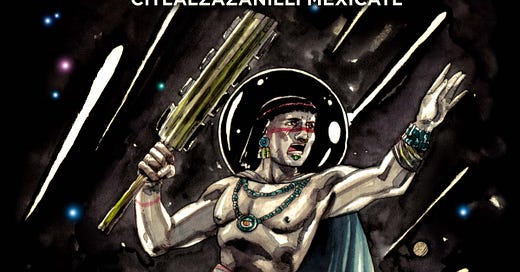Years ago when I first really pondered my dual-ethnic Chicano identity, I felt like a fraud, that I needed permission to be who I needed to be, not some kid whose brown father wanted to be assimilated, absorbed into the status quo of American whiteness. That’s the real fade, you know, when your brown dad wants you not to be brown.
It’s been decades and I still sometimes feel this sense of needing someone brown to say, “Yes, you can be Chicano. You don’t have to listen to your dad anymore.”
Recently, while studying There There by Tommy Orange I found some powerful dialogue about identity, and thought, man, I can repurpose that. This character tells her son, “Don’t let anyone tell you what being an Indian means . . . You’re Indian because you’re Indian because you’re Indian.” And so I changed a few words around, started chanting them to myself: “Don’t let anyone tell you what being a Chicano means . . . You’re Chicano because you’re Chicano because you’re Chicano.”
For a while now I’ve been carrying these words with a chip on my shoulder, having been granted magical permission by a fictional character talking to her Indian son. We get power where we can, yeah?
I think that like any marginalized group, Chicano sci-fi writers need to gather, create their own text, which the editors have done with El Porvenir, Ya!: Citlalzazanilli Mexicatl (where you can read my new story, “Sky Seekers”). It’s these kinds of moments where we sing, “Sí se puede,” because we can, and we did, and we’re doing. All of us.
Throughout 2021 I workshopped my Chicano sci-fi-horror novel The Deading at University of Riverside Palm Desert Low Residency MFA. Stephen Graham Jones (The Only Good Indians, My Heart Is a Chainsaw) and Tod Goldberg (Gangsterland, Gangster Nation, The Low Desert) have both been a huge help in restructuring its many moving parts. The Chicano birder in the story someone might say is a multiverse reflection of myself had I been fully brown, had I been a teen nature lover in a near future where climate change and alien forces created a vengeful ocean spirit. This is what’s special about sci-fi. You can imagine whatever you want. You can really take yourself out there, into space, into the future, into disrealities, bizarre technologies, and strange time warps where multiple yous might exist at once. And you can explore as many “selves” as you want, identities connected to humanity and Chicanismo that no one could dream up but you. It’s all candy-coated as science fiction, as a tech dream in motion. And it doesn’t even have to be a you, it can be about anybody.
This little Meso-American-pyramid-shaped drone in my story “Sky Seekers” is Chicano futurism in motion, one of these strange technologies of a particular brown culture, my culture, and one at that with multiple genders and the possibility of sentience. I imagine she/it/they’s simplicity and complexity woven together like the imagined ghosts of my ancestral past. We don’t know them, but we do know them. We inherit their memories, their forms, their art, their mannerisms. We Chicanos have the power to build our brown worlds and universes fueled by these hidden Chicano-because-you’re-Chicano-because-you’re-Chicano experiences that we can’t see but know exist.
We don’t all have to speak Spanish either. Like the anthology’s editors say, “The title sums up the underlying roots of this collection; it takes Spanish, Nahuatl and English to tell the whole tale.” Hey, as a dual-ethnic I know one out of three, that ain’t bad.
The editors also say: “As you read from story to story, if you’re Mexican-American, Chicano, you’ll find yourself in space, physically, mentally or emotionally, but it is you there, not an ‘other’ or a version of who others think we are. Sci-fi is the perfect place to explore the relevance of Chicanismo to literature, to the future and to the destiny that awaits all of us.”
We don’t all have to have grown up in the Chicano Movement, or have been rallying in marches down city streets, though it helps for sure if you do have some of those experiences to throw into interstellar theaters. But you don’t have to. We don’t have to. We just have to be. And whatever that is, no matter how you see yourself, if you’re writing Chicano sci-fi, and you’re Chicano because you’re Chicano because you’re Chicano, then you’re one of us.
*Don’t forget to order your copy of El Porvenir Ya!": Citlalzazanilli Mexicatl




